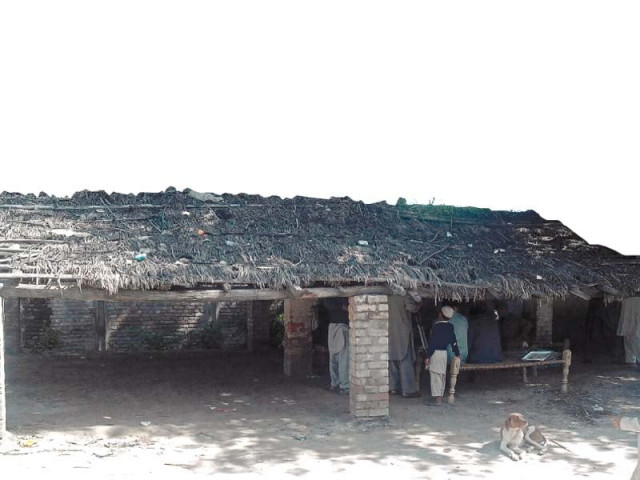300 years of history: Last of chaupals, the archetypal boys club
A communal space, the chaupal in Khazana still attracts company of men

DESIGN: TALHA KHAN
A chaupal, a rural community space, was once where men met for a chat and some qehwa (Green tea). It was the proverbial old boys club, the college fraternity, the village square – another variation of a men-only space where they would gather to share tales and sorrows.
The structure itself can be as simple; a raised platform under the shade of a thick hovering tree or a thatched roof. Some were more elaborate, with the foundation of the chaupal meticulously laid. The chaupal would be built using funds raised by the community. But times changed, life started moving on a faster track and persistent uncertainty over law and order in the city pushed people indoors. The tradition of the chaupal is all but gone from villages in Peshawar.
Sex and spaces
A fundamental feature of rural life, the 300-year-old history of the communal space was forged in the absence of women.
It served as a place where men celebrated their success, discussed their problems and sought their resolutions. They would discuss news in the region and turn to each other in times of grief and sorrow.
A convention was held each day where neighbours, friends and other residents gathered and discussed their lives and current affairs. The chaupal is said to have been established in the 17th century. According to local history, the first structure was Jabbar Khan’s. Jabbar laid its foundation in a village in Khazana and built it using expensive diyar wood.
Rahat Zaman Khan, a resident of Khazana, told The Express Tribune his grandfather, Mansoor Khan, was a landlord when Jabbar’s chaupal was made.
According to Rahmat Zaman, it was used for court hearings and other social matters.
He added dozens of jirgas and other disputes were resolved here by mutual understanding and consultation.
Test of time
With the emergence of technology that allows for online community spaces which connect people instantly and collectively—think Whatsapp and Facebook group chats—rural lifestyles evolved. It did not help the tradition of chaupals that with industrialisation, environmental pollution increased and climate change resulted in global temperature increases.
“It’s not just chaupals, even hujras are falling out of favour due to poor law and order,” Muhammad Shoaib Khattak, a resident of Karak, told The Express Tribune. Chaupals transformed into hujras, bethaks or guesthouses, slowly vanishing.
According to Rahat, the concept of chaupal remains in only three places in the city, Khazana, Landi Arbab and Tehkal where people still gather.
Haji Gul Akber, an octogenarian from Khazana, retreated into happy old memories as he spoke to The Express Tribune. Recalling memories at chaupals, he said, “Everyone would sit and sort out their disputes, share their grief and celebrate festivals and occasions together.”
The structure in Khazana is still in good form even after the passage of several hundreds of years. New bricks have been used inside the chaupal for support.
Published in The Express Tribune, April 15th, 2016.













COMMENTS
Comments are moderated and generally will be posted if they are on-topic and not abusive.
For more information, please see our Comments FAQ